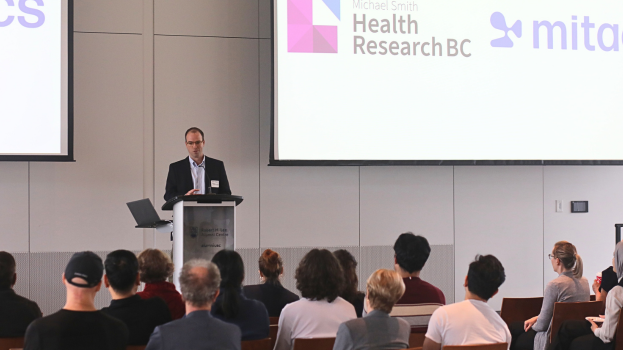Dr. Robert Reid shares the urgency of improving health care with research
25 September 2024

We spoke with Dr. Robert Reid this summer. Robert is a global leader in learning health systems, and the keynote speaker at our annual conference, Putting Patients First. We reached him in Toronto.
Q: Can you share a little about yourself and your work?
My name is Rob Reid. I’m the senior vice president of research at Trillium Health Partners, which is a large hospital system in Mississauga, Ontario. I’m also the Hazel McCallion Research Chair in Learning Health Systems. Most of my work revolves around learning health systems. How can we deploy evidence in health systems quickly so that Canadians can benefit as soon as possible? I’ve been working in this for a number of years and really starting to build momentum in this area across Canada.
Q: How did you get interested in learning health systems research?
There’s a couple of reasons for that. One is that Canadians have a lot of problems in health care right now, a lot of problems across Canada. You only have to look at the media any day to see that emergency rooms are too full, lack of primary care, coordination of services between specialty care and primary care is often uncoordinated, information gaps and services are missing. We can do better in terms of health care in Canada. That means we really have to do a learning journey about how our systems can improve end-to-end for entire populations.
The second reason is that research is health care. We’ve been studying many of these things for years, but we’re not deploying research findings in ways that can really help. Learning health systems is really about blending research as quick as possible, so we can rapidly evolve and improve the services we deliver to Canadians every day. It’s about improving the health of Canadians through research.
Q: How does this relate to quality improvements in health systems?
Quality improvement and learning health systems are tightly related. In some respects, I’ve talked about learning health systems as an evolution of quality improvement. It’s quality improvement on steroids. Often, we take very similar approaches in quality improvement, and now we’re using advanced research methods to advance the system rapidly.
Q: How does patient-oriented research fit into learning health systems?
If you think about learning health systems – and we often talk about it as a three-legged stool – it’s based on partnerships. This includes system operators, the people running the systems and that includes our physicians. It also includes scientists who are really enabling those changes to occur. And most importantly, it includes patients, families and communities right there as full partners, so we can understand their needs, aspirations and preferences in terms of how we deliver health care. We can get their input right at the beginning, and we can develop certain systems that serve them, not just serve our system.
Patient-oriented research is at the full fulcrum of learning health systems research. So, it involves patients at every step of the research cycle and every part of the learning journey. From understanding the nature of the problems that we have and that they’re facing every day, particularly for equity-deserving groups. Asking patients to specify the problems.
Second is helping get their input about what is most important to change. What are their priorities in terms of what we need to improve and do differently.
Third is involving them in the co-design. Fundamentally involving them in the co-design in our systems, so it’s working for them in everyday settings and tailored in ways that are meaningful to them. Often, we think about health care as one-size-fits-all solutions. But people come in many different ways and have different needs and preferences. We have to develop at their behest what our system looks like. Also involving them in the evaluation and spread of the solution.
So, it’s really involving patients and the best of patient-oriented research at every point of our learning cycle. I see patient-oriented research and learning health systems as tightly integrated. We can’t do learning health systems without a really good grounding in patient-oriented research.
Q: A learning community brings people together to solve a shared health problem. It can be seen as the first step on the journey toward a learning health system. From your experience, what is the role of learning communities in a learning health system?
We’ve got many different health systems in Canada, and across the world. We’re often trying to solve the same problems with different approaches. We’re also very isolated. We’ll solve a problem in an Ontario hospital system, but we won’t know necessarily what’s happening in British Columbia and how problems are solved there.
Learning communities are bringing people together to learn about what the experiences, successes and challenges might be in different settings. That’s how we advance – we learn from each other as we advance. That’s an essential component. Often, we learn in silos, and it’s slow, and we don’t benefit from the learnings from other people and other places.
Q: The BC SUPPORT Unit is working to build capacity and skills in the learning health systems approach. But many people aren’t sure how to begin. What would you recommend to help people get started with a learning health systems approach?
One thing is to ground yourself in a common understanding of what a learning health system is. Often, there are different nuances and opinions.
The second is to look at your present assets that are already in the system. How can we join them up to create a more systematic approach to learning? There are data assets, patient and family support assets, health system assets – but often they’re isolated. Learning health systems is about joining them up so we can take more of a systematic approach.
These are two suggestions to get started: develop a common understanding and look at where you currently are. When we start looking at where we currently are, we actually are doing learning in certain places and in certain circumstances. It’s really taking the lessons of what’s worked in the past and deploying them in the future.
Q: What can people expect to hear from you at Putting Patients First?
One thing they can expect to hear is really the centrality of patients. The centrality of equity. One of the failings across the world is our systems serve some people than others. Many people fall through the cracks. Equity is a central component in advancing learning health systems. How to make sure we’re lifting all boats for the populations we serve, not just some boats.
The second thing you’ll hear from me is whole systems solutions. Meaning when we’re thinking of learning health systems, we’re taking a whole systems approach. We’re not taking it piece-meal where we’re looking at primary care isolated from hospitals, isolated from long-term care. We’re thinking about health systems together. We’re thinking about how it moves beyond the formal healthcare systems to the informal systems and how it moves into the social care sector, because we know that social services impact health to a large degree. We’re going to talk more expansively around the health system and how we bring a whole systems approach to bear.
The third thing we’ll talk about is spreading and scaling. How do we lock in solutions that we know are working and continue to advance learning and improvement. In Canada, we often faced with pilot projects that come and go. We don’t lock in solutions. We don’t spread them.
Q: What is the one thing you’d want people to take away from this conversation?
One thing is we don’t have any time to wait. We need to start moving rapidly in Canada. We’ve got too many people falling through the cracks, too many problems.
If we’re really going to advance the health of people in Canada, we really have to all engage in a learning health system philosophy. How are we going to learn to improve our system so people aren’t falling through the cracks. So, there’s an urgency to this method, to this talk. My hope is to inspire people to want to participate in learning health systems work, and how can we advance for the health of Canadians.
Listen to part of our conversation.
Dr. Robert Reid is the Hazel McCallion Research Chair in Learning Health Systems, Institute for Better Health and Senior Vice President, Science, Trillium Health Partners. Rob is a global expert and thought leader in population health, learning health systems and primary care.
The BC SUPPORT Unit is a CIHR-funded provincial initiative that moves research evidence developed with patients and communities into practice. We provide services to researchers, patients, policy makers, clinicians and health system leaders.
Robert is a keynote speaker at the 2024 Putting Patients First conference. Learn more.





